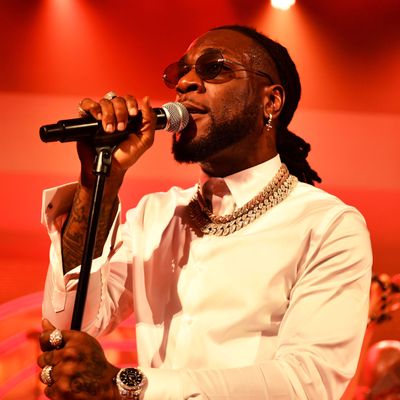
When Burna Boy recorded the album that he’d go on to call African Giant in the fall of 2018, he was still growing into the title. The Nigerian star was already signed to Atlantic Records — a feat for an artist as unabashedly global as himself, fusing west African, Caribbean, and American music into a blend that’s nothing short of addictive. But he wouldn’t fully take the throne until the following year, when that album became one of the year’s most celebrated (even netting him a Grammy nomination), he sold out London’s Wembley Arena, and between it all, he featured on Beyoncé’s Lion King: The Gift album. New album Twice as Tall, his fifth, released a little over a year after African Giant on August 14, only continues Burna Boy’s rise. It’s executive produced by Diddy and has features ranging from Senegalese legend Youssou N’Dour to grime pioneer Stormzy. (It also comes two weeks after “JA ARA E”s scene-stealing appearance Black Is King.) And while Burna Boy uses opening track “Level Up” to revisit his wild recent rise, he also makes clear that he’s not getting complacent.
The first voice on “Level Up” isn’t Burna Boy’s, but a tinny sample of 1950s hitmaker Pat Boone singing a song from the 1959 film Journey to the Center of the Earth. “Oh, I’d have to be twice as tall, at least, to view better than I do,” he sings. It gives way to Burna Boy’s own anxieties. “Start feeling like I had enough, then I contemplate giving up,” says the performer who’s always projected a rapper’s swagger. In the second verse, he dives into specifics: finally being able to afford his weed when he started selling out venues, throwing up from nerves before the Grammys (Angelique Kidjo, a legend of her own who featured on African Giant, won in the World Music Album category).
It’d all be enough to discourage some, but not Burna Boy, who’s been hustling since he dropped two mixtapes in 2011. The simple beat finally picks up a bit toward the end of the second verse — “Level Up” isn’t trying to be Twice As Tall’s most exciting or adventurous track — as Burna Boy does the same. “I remember feeling legendary in Wembley arena,” he says. “You’d be proud of me too, if you knew where I was coming from.” He did, after all, leave his home of Nigeria to study in London, only to return to Nigeria to try his hand at music instead. The leap really began to pay off in late 2018, when his infectious hit “Ye” blew up his international profile and emblematized Nigerian pride.
Where the one white voice on “Level Up” projected some of Burna Boy’s self-doubt, the two Black icons who join him only offer encouragement. N’Dour is far and away the most exciting part of the track, stopping the show with a simple, inspiring chorus in Woluf and English. After the first chorus, the Boone sample returns, but you can barely make out the words as it’s pummeled by drum and bass — Burna Boy now demands to be listened to on his own. Diddy delivers his own message in the outro as N’Dour finishes the final chorus: “Don’t be afraid to step into your greatness, people.” His message bleeds into “Alarm Clock,” and the album is off with a bang, for 45 more minutes of Burna Boy confronting his critics, standing against oppression, pushing himself, and (deservedly) flexing. He is an African giant now, no question. Why stop there?
More From This Series
- Demi Lovato’s Rock Side Has Always Been There
- The Kid Laroi Is a Pop Chameleon
- Pop-Punk Is a Tool for Self-Acceptance on WILLOW and Avril Lavigne’s ‘G R O W’


